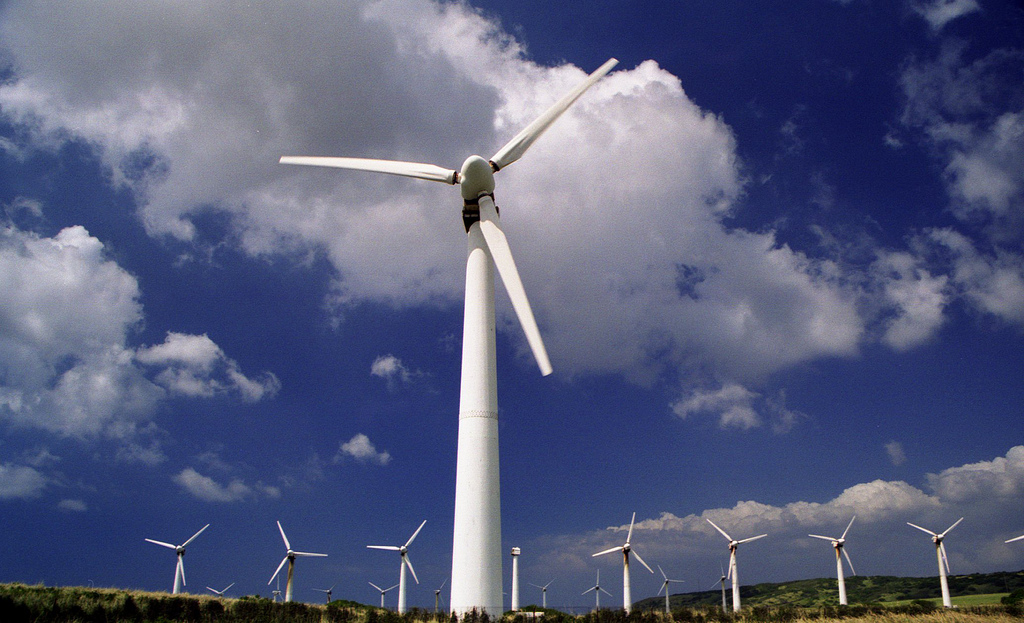In a key vote last week, the City of Austin set a goal of net-zero emissions by 2050, making us one of the largest cities in the world taking direct action to combat climate change. However, this decision was largely political in nature, driven by a majority of the voting population here and their concerns for the environment. That’s not the case in Georgetown, Austin’s much smaller neighbor, which is going green WAY faster than us. In fact, Georgetown expects all of their electricity to come from the sun and the wind by 2017.
That’s not even the crazy part! Get this: They’re run by Republicans. Yeah, that’s kinda weird. Not Austin weird, but maybe there’s something to learn here.
So, we asked why this decision was made and what lessons Austinites can take away from Georgetown’s experience. Georgetown Mayor Dale Ross — the same guy who recently became a viral sensation for accidentally taking a live microphone to the bathroom — took some time out of his busy schedule to break down the reasons why his city is racing past us in the green sector. Surprisingly enough, he explained that politics didn’t even enter into their equation…
——
Austin.com: You’ve called Georgetown’s move to renewables “a business decision,” not an ideological one. Could you explain that?

- Georgetown Mayor Dale Ross.
Mayor Ross: “This was a fact-based decision that was made by the city. We signed a 25 year contract for solar and wind energy, and that’s going to create cost certainty for the ratepayers in Georgetown. With fossil fuels you have regulatory risk. More regulation on fossil fuel production increases costs to the producers of that kind of energy. Those costs are passed onto the ratepayers… So, we looked at this this as a business decision first. The leadership in Georgetown is very pragmatic… We looked at natural gas, and the [projected 2017] pricing was a little big higher than solar and wind. So, in our case this was a very practical decision first and foremost, and we’re glad for the unbelievable societal benefits [of renewable energy], but this was a business decision. Some places do this as a political decision, but in governing our city we look for those intersections where you have mutual benefit. The ratepayers have a benefit with cost certainty, and it’s healthy for the environment as well.”
Why does this make business sense for Georgetown?
“You have to have three components to make this successful. One, you have to have transmission lines to get [green power] from the source. The State of Texas has invested about $7 billion in transmission lines, so we have a favorable infrastructure. That’s element number one. Number two, the regulatory environment comes into play. In the City of Georgetown, for example, we have a virtual monopoly on providing electricity. Cities like Houston have multiple choices. So, we make the decision for the citizens on where we’re going to get our energy. Other cities don’t have that choice. The other thing is that you have to look at the environment. You have to have an environmental situation where the sun shines on a regular basis, and the wind blows on a regular basis. In our state, that’s west Texas. So if you look at those three critical elements to implement 100% green, I don’t think every state can say that, because they don’t have these three elements. Some of this state, the way the regulatory environment is, it would be virtually impossible for them to go 100% green unless they change the regulations. This was just a perfect opportunity.”
You based this decision, in part, on trends that predict solar and wind will become cheaper than fossil fuels within the next two years. Do you think those trends will continue?
“Remember back in the go-go days of computers? Moore’s Law said that computing technology doubled every 18 months and the price was cut in half every 18 months. I just think that, for solar panels and solar technology, it’d be a wonderful thing for some of these young kids in college today to make some improvements to these panels, just like they improved on computers. So yes, this could be even more cost effective in the near future than it is today. I think that is wonderful.”
Austin wants to reach net-zero emissions by 2050. Do you think adopting 100% renewable power would work here in the near term?
“I’ve heard discussions, but I’m not an expert on the City of Austin. I believe they have plenty of competition for energy providers; they don’t have a virtual monopoly. It won’t happen unless all of the producers get wind and solar at comparable prices to natural gas. The key here [in Georgetown] is that we have a virtual monopoly. The citizens don’t really care where the electrons and protons come from, in large part. We do have environmentalists here who are very concerned, and I recognize that. I think environmental factors are important. But for ratepayers, by and large, it’s about cost certainty and how much they are paying for utilities.
“I’m not familiar with Austin’s situation, it may be more complicated. But one of the great things about renewables, specifically wind and solar… We’re a state that’s been through a drought for the last five years, and when you produce fossil fuel-based energy, it takes a lot of water. When you look at wind and solar, it doesn’t take near as much water to produce those types of energy. So you really get a couple of environmental savings… The water aspect, in Texas, comes into play [in this decision] as well.”
Have you gotten any political backlash? How would you recommend other elected officials speak up for green energy?
“I think as an elected official you have a duty to the citizens that you represent. In our case that is to deliver a service, electricity, at the lowest possible cost. So what I would suggest is that [going green] is serving your constituents by creating cost stability over time. It improves the quality of life, and that’s what we’re elected to do. I think that’s the message I would send to other elected officials. That’s the message I’ve sent to the people of Georgetown. I am a conservative. I’m a CPA by day and mayor by night. People pay me to give them objective financial advice, and the decisions I make as an elected official are based on facts, objective facts. My goal is to make decisions that positively affect the citizens of Georgetown. I don’t think there’s a disconnect between that.
“When you run for office, you have to be a bold, visionary leader. Leadership is not necessarily making the easy decisions, but making the tough decisions that’s best for the people you represent. It takes a little bit of courage sometimes to do that. But, the folks that are really interested in the environment are very supportive of me. The vast majority of other folks are just happy that we’re getting some environmental benefit — but also, because we made the business case, they know it is helping them financially by creating stability for the next 25 years. We should not be seeing much volatility because of that. We are also cutting taxes by going green, because the profit that we make off selling wind and solar energy are dollars that go into the general fund. Those are taxes that the citizens don’t have to pay. We transfer from the utility fund to the general fund about $12 million a year, give or take. That’s $12 million that we don’t have to tax residents for.”
How have businesses reacted to Georgetown’s decision to go 100% renewable?
“We’ve already seen a swell of interest from large corporations that have adopted green energy policies. Some of the large technology companies have built their own solar farms, which isn’t one of their core activities. They’ve done it out of necessity. If you come to Georgetown, we’ve already gone green for you! Look at Walmart. They have a green energy policy. How easy is it now for Walmart, in Georgetown, to go green in 2017? The second they flip the switch on their store, they can make the case that they are now 100% green at that store. We’re able to help them out. There’s other large corporations in every large community, and we’re helping them fulfil their energy policies.
“We’ve got a great deal of interest from California companies thinking about expanding here, and not just because of green energy but because Georgetown is a wonderful community… We have a great quality of life here. But this is really, if you look at green energy from a business perspective, this is a huge economic development tool. We have one datacenter here and we have the ability to bring in others, which are very good for communities because they have a low impact on city services, high paying jobs, and they consume a lot of electricity. Now they can do that in a green way by relocating to Georgetown. That’s why this works even though I’m a conservative. I’m a very pragmatic, practical kind of leader. This is good business.”
What do your detractors say?
“The biggest concern people have is, ‘What happens if the solar farm and the wind farm go out of business? Are we going to go dark?’ The answer is absolutely not. We would seek out other sources of wind and solar and other renewable energy sources. The fallback position is that we’d just go back to natural gas in the interim. We wouldn’t go dark. Instead of solar and wind going into the grid, it would be supplemented with natural gas. That’s worst case scenario.
“There is a certain contingency [in Georgetown] that’s also worried about the subsidies that solar and wind get from the federal government. Well, I would remind people that the fossil fuel industry gets the vast majority of the tax credits and expenses for the production of fossil fuels. [Using those fuels] gets you depletion at the corporate level. In your own personal income tax you get depletion as well. I’m not an expert [on environmental issues], but I do also believe that the more pollutants you put up in the air, it can’t be helpful. I think everybody knows that and agrees on that. So if we can reduce the pollutants in the air, that just makes a better community to live in. The fact that we have these cost effective alternatives available means it has becomes a question of ‘Why wouldn’t you use them?’ It doesn’t make any sense to [keep using fossil fuels] at that point.”
——
Disclosure: Austin.com Executive Editor Stephen C. Webster is a mentor with The Climate Reality Project.
Featured photo: Flickr user Brian Snelson, creative commons licensed.








